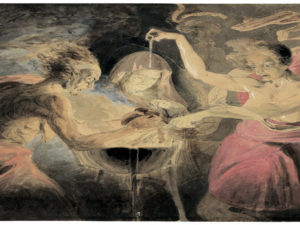
By Helen Marshall
In the summer of 2016, Nina Allan and I began to talk about the possibility of organising a shadow jury for a science fiction award. We thought such a project might encourage the kinds of lively conversations that surround major literary awards such as the Giller Prize, in Canada, where shadow juries were first used, and the Man Booker Prize. The project, in some respects, had a political edge: Earlier in the summer the United Kingdom had been through the divisive Brexit vote and, at the same time, the previous several years the genre community had seen an increasing number of scandals including the Sad/Rapid Puppies’ controversial introduction of slates to the Hugo Awards. Both Nina and I had come to feel as if more spaces were needed for long-form criticism open debates about literature and the cultural values it might represent.
The idea appealed to me also as an academic working at the intersection between the fields of creative writing and publishing. I’ve become increasingly interested in awards processes and what awards mean within the speculative fiction community. I’ve won writing awards, across the genre and literary spectrum, sponsored by fans, juries and judges, and I’ve worked with awards organisations such as the Shirley Jacksons. I’ve also witnessed organisations such as the Horror Writers Association and the British Fantasy Society experiment with awards that melded these divergent systems together, sometimes managing to stave off the various criticisms they had been subject to previously, sometimes not.
Awards, it seems to me, work in unusual ways in the science fiction community. They link to an existing community of fans, writers and publishers that has its own particular shape and weight. Fandom is changing. Having spent much of the twentieth century on the edges of literary culture, what was once marginal is now thoroughly mainstream. The success of major titles such as Harry Potter, Game of Thrones and The Hunger Games, promoted by cinematic adaptations, has broadened the pool of readers—but simultaneously brought pressures of its own, the pressure to sell and sell big, to build blockbuster brands.
Awards fit awkwardly into this changing space. Are they primarily markers of prestige? Are they handed out by fan communities to honor the successes of their own? Do they chart new trends? Whereas winning the Man Booker Prize can have huge ramifications for an author’s career—and their sales—this isn’t really the case for science fiction awards. Many writers and editors will tell you that even the Hugos in most cases don’t result in a substantial change in sales numbers. One case, oddly enough, where it did was Cixin Liu’s The Three-Body Problem which won the 2015 award for best novel, a year that was mired down by the Sad Puppies/Rabid Puppies slate-creation. In fact, it may well have been the high volume of conversation in online circles surrounding those Hugo awards that inadvertently contributed to the sales boost. Certainly, journalists could sense a story and so the firestorm may well have provoked media attention that simply wouldn’t either ways have focused on the Hugos.
And if awards themselves occupy an ill-defined space then the relationship between awards and criticism is even murkier. Sometimes critics participate in the process of choosing award winners but just as frequently that role falls to the fans themselves, through various membership and voting systems. Fans of a genre that has always had a popular element—almost by definition—and has for much of its existence been barred from prestige culture may well have a justified suspicion of criticism. And yet just as science fiction is going mainstream, it is also entering areas where it was previously barred: there are several degrees that include science fiction literature within the UK and the field itself has developed through prizes like the Clarke Awards and through institutions like the British Science Fiction Association.
As I took on the role of course-leading an MA in Publishing, my interest in the topics continued to grow, particularly as science fiction awards seemed to become the hub of increasingly contentious debate. Nevertheless, it wasn’t so much the possibility of debate that inspired the Shadow Jury so much as that it seemed like an excellent way to trial a kind of long-form criticism that seemed to be vanishing. The Arthur C Clarke Award offered a good focal point, in part because criticism seemed to be built into the history of the award and in part, for practical reasons, because the submissions list allowed the jury members a way to limit their selections.
So far, so good.
In the process of watching the Shadow Clarke deliberations unfold, I deliberately took a backseat role. Nina and I had a number of intense discussions over the proceedings, particularly as we began to encounter unexpected curveballs, but also as a way to continually test out what we were doing and try to tweak our methods along the way. For example, when it came time to include links to various books from the submissions list we decided to use the Amazon affiliate links set-up by the Clarke Award as a way of tacitly contributing; if the criticism of the jurors produced sales it seemed right that the money should go toward sustaining the award. But even this wasn’t an easy decision precisely because we had to weigh the ethics of including Amazon links (let alone affiliate links) at all in a project that we felt ought not to be commercially driven. That, after all, had been the point—not to sell books but to talk about books. Still, within digital spaces, it seems increasingly difficult to separate conversations from marketing and I suppose my own growing awareness of the fraught entanglement of those two spheres is one of the things I took away from the process.
In reading Nick Hubble’s response to the process, I was struck by how similarly I feel. The project began from a place of optimism but soon encountered hurdles. I too was taken aback by the comparison with the Sad Puppies/Rabid Puppies project and likewise hope in the end the differences between the projects have emerged more clearly. This was always about generating thoughtful conversation—and that, I think, it has done in spades.
One of the most productive elements of the Shadow Clarkes has been the level of conversation. I have not agreed with everything said but I’ve been delighted by the willingness of those involved to have these conversations, as openly as possible. This is a time when we need to find ways to talk to one another, when we need to question and scrutinise our processes, and when we need to give debate a place to happen. These debates aren’t always easy—but they are always useful. Whenever we find ourselves saying, “Why do we still have to keep having this argument?” it is worth remembering that there are always new people entering the conversation and there are always new forces in play that change the nature of the argument. The question “What is genre and what is not?” came up again and again precisely because genre barriers have been disappearing as mainstream imprints seek out genre readers and genre publishers attempt to win over mainstream fans. The upside of this is that science fiction is no longer the second-class citizen it once was—but this transformation has neither been fully realised nor realised without its own set of difficulties, fractures and fissures. It’s been interesting to see which lines of argumentation have struck nerves. How important are genre labels? What is the difference between genre and literary, between genre and mainstream? What is unique to science fiction writing and what ought to be rewarded? What specific types of pleasure does it offer? How ought critics to respond to these differences?
One of the emerging themes in the conversation across the Shadow Clarkes that, perhaps, ought to be addressed is the pervasive influence of marketing within our culture generally and within publishing specifically, something alluded to by various Sharkes and which I’ve encountered more and more within my reading of the history of publishing throughout the twentieth century. John Thompson clocks this in his fascinating book Merchants of Culture: The Publishing Business in the Twenty-First Century. He traces a range of important trends: the rise (and subsequent decline) of massive advances, the conversion of independent bookshops to chains (and their subsequent decline), the integration of independent publishers into conglomerations demanding more predictable sales (presumably to avoid their subsequent decline), the decline of midlist authors, and the rise of digital book production. The mantra bigger is better has guided many of these trends, whether it’s the size of the advance, the company or the sales figures. These trends have changed the nature of publishing—and while there may never have been a time when publishing was divorced from commerce (the title Merchants of Culture seems a fitting description for publishers!) the balance is shifting.
Likewise, there’s an ominous shift in the public’s perceptions of the humanities in general. Universities, under attack for rising tuition fees and mounting student debt, are struggling to adopt “employability” and “impact” as their mantras. Both of these are valuable: it’s hard to suggest that a university shouldn’t care about whether its students get jobs and whether the research it generates matters outside the ivory tower. But what universities are failing to articulate is their value as spaces for independent, critical thought. This is what the humanities do best and what they ought to keep doing.
Like Nick, as the project comes to a close, I feel both exhausted and invigorated. Mostly I feel grateful to the Sharkes themselves who rather heroically devoted themselves to purchasing, reading and reviewing these books and for engaging in online debate. This was a project driven by their passion and by their investment in science fiction. Among these, Nina deserves special credit for both conceiving of the project and for working tirelessly to keep the conversation going. Tom Hunter, the administrator for the Arthur C Clarke award, also deserves thanks for gamely going along with this project as do all the readers and commenters who joined us for the ride.
The Shadow Clarke project has also made me think seriously about the need for spaces for debate—messy, contentious, open debate—particularly as our cultural spaces seem increasingly under threat of being co-opted. The Sharkes have profoundly reshaped my thinking about the spaces where these discussions take place and how best to foster them. As an academic, a critic and a writer I’m grateful to them and I know the impact of this process will stay with me as I think about how best to keep the conversation going. I’d be very happy to hear suggestions about how to continue and so I invite you to contact me if you have ideas.
*
Dr Helen Marshall is an acclaimed writer, editor and book historian. She is the Senior Lecturer for Creative Writing and Publishing at Anglia Ruskin University and the general director for the Centre for Science Fiction and Fantasy.
1 Comment
Pingbacks
-
[…] “Keeping the Conversation Going by Helen Marshall” […]



